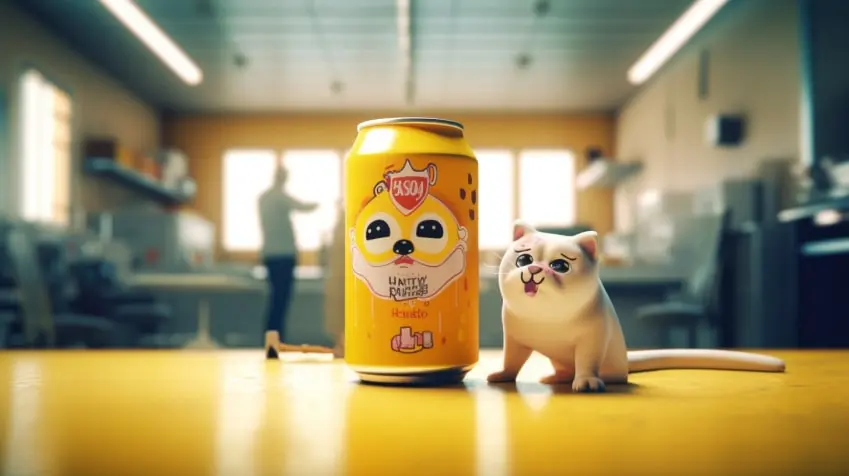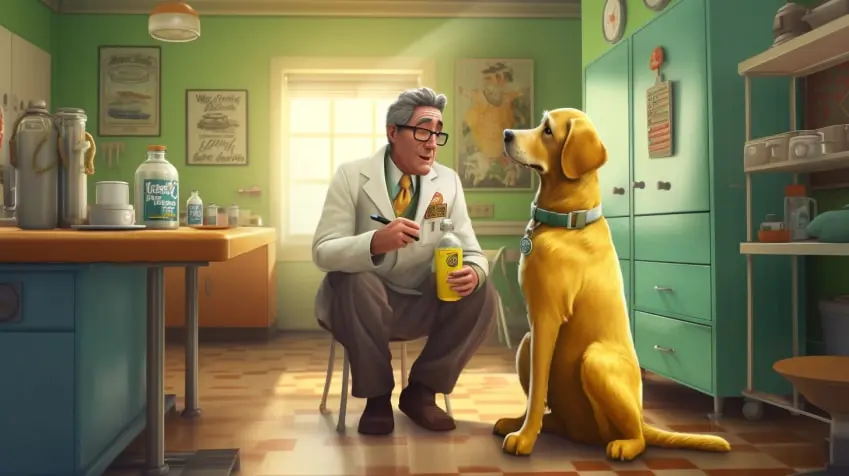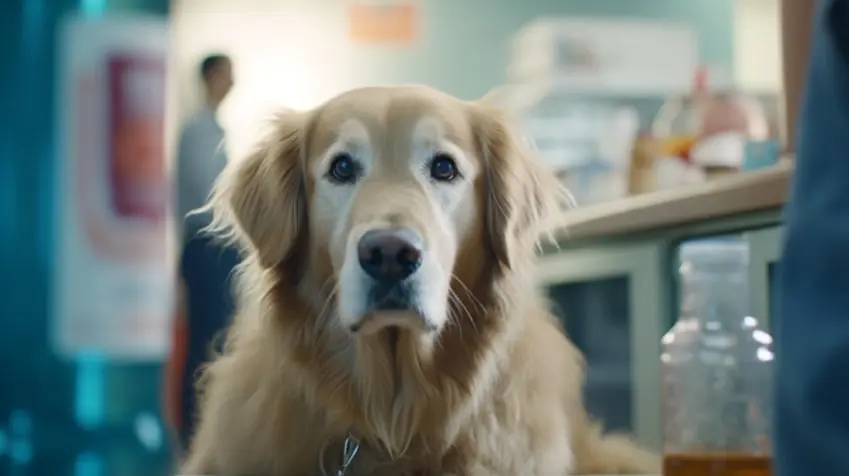Can Dogs Drink Sprite?
Dogs have been the most loyal companions of humans for centuries.
As much as we love our pets, it is essential to ensure their well-being and safety at all times.
One of the primary concerns that dog owners may have is regarding what their dogs can and cannot consume.
But Can dogs drink Sprite? The answer is a firm no!
While it may be tempting to share a sip of your favorite carbonated beverage with your furry friend, it’s important to understand that dogs and soft drinks don’t mix well.
In fact, giving your dog Sprite or any other sugary, carbonated drink can have serious health consequences.
But why exactly is Sprite harmful to dogs? In this article, we’ll explore the reasons why dogs should steer clear of Sprite and delve into the potential risks it poses to their well-being.
So, let’s dive into this vital topic and discover why it’s best to keep Sprite away from our four-legged companions.
Key Takeaways
- Carbonated drinks like Sprite can be harmful to dogs and should be avoided.
- It is important to provide access to water throughout the day for dogs.
- Consult a veterinarian before introducing new foods or drinks to your dog’s diet.
- Regular exercise, grooming, and mental stimulation are important for a dog’s overall well-being.
Understanding a Dog’s Digestive System
The canine digestive system is a complex network of organs and processes that work together to break down food and extract nutrients for energy and bodily functions.
The system includes the mouth, esophagus, stomach, small intestine, large intestine (colon), rectum, and anus. Each organ plays a specific role in the digestion process.
One important aspect of canine hydration is providing dogs with access to enough water throughout the day.

While water is essential for maintaining a dog’s health and well-being, some pet owners may wonder if their dog can drink other beverages like Sprite or other carbonated drinks.
However, it is important to note that not all beverages are safe or healthy for dogs to consume.
In fact, many popular human beverages can cause serious harm or even be toxic to dogs if ingested in large quantities.
Therefore, it is best to stick with dog-friendly beverages such as plain water or specialized pet drinks formulated specifically for canine consumption.
Harmful Ingredients in Soda for Dogs
Harmful additives present in carbonated beverages can cause potential health hazards for our furry companions, but have we ever considered what specific ingredients in soda can be detrimental to their well-being?
Dogs should not consume soda because it contains high amounts of sugar, artificial sweeteners, caffeine, and other harmful preservatives.

These additives can lead to obesity, diabetes, and other chronic diseases that are detrimental to a dog’s overall health.
Apart from its high sugar content, the carbonation present in soda also poses a threat to dogs.
Carbonated drinks like Sprite contain gas bubbles that can lead to bloating or even gastric torsion (twisting of the stomach). Additionally, the acidity of soda can erode a dog’s teeth and damage their enamel over time.
Therefore, as responsible pet owners who care about our pet’s health and wellbeing, it is essential never to offer them any carbonated drinks like Sprite or any other sugary beverages.
Risks Associated with Dogs Drinking Soda
Consumption of carbonated beverages by canines has been linked to various health risks that require attention.
The dangers of carbonation are significant for dogs, particularly when consumed in large quantities.
Carbonated drinks like Sprite contain high amounts of sugar, which can lead to obesity and restlessness in dogs.
Moreover, the carbonation in these beverages can cause bloating and gas buildup in a dog’s stomach, which can be painful if left untreated.

Another factor that needs consideration is the impact on canine hydration. Dogs rely heavily on water intake to maintain their bodily functions, including digestion and temperature regulation.
When a dog consumes soda or any carbonated beverage, it reduces their interest in drinking plain water.
This reduction in water intake could put them at risk of dehydration, leading to symptoms such as dry mouth, lethargy, reduced appetite, and sunken eyes.
Therefore, pet owners must abstain from feeding their dogs with soda or other fizzy drinks as they pose severe health implications for their furry companions.
Alternatives to Soda for Your Dog
One solution to prevent health risks associated with carbonated beverages for canines is to provide alternative, safe drink options such as plain water or diluted fruit juices.
These natural drink options are not only healthier but also help improve healthy hydration levels in dogs.
Drinking enough fluids is essential for maintaining a dog’s overall health and preventing dehydration-related complications.

Some fruits, such as apples and oranges, contain natural electrolytes that help replenish lost fluids in the body.
Diluted fruit juices provide an excellent source of natural electrolytes while also satisfying a dog’s thirst.
However, it is important to note that some fruits can be toxic to dogs, so owners should always consult their veterinarian before introducing new foods or drinks into their pet’s diet.
Ultimately, providing hydrating alternatives to soda is one way pet owners can ensure their furry friends stay healthy and happy.
Signs of Soda Poisoning in Dogs
Symptoms of carbonated beverage poisoning in canines can include gastrointestinal upset, vomiting, diarrhea, bloating, and even potential life-threatening complications such as electrolyte imbalances and seizures.
These symptoms are caused by the high sugar content, caffeine, and artificial sweeteners present in soda.

Dogs have a different digestive system than humans and cannot metabolize these substances like we do. Therefore, it is important to keep all carbonated beverages away from dogs.
If you suspect that your dog has ingested soda or any other carbonated drink, immediate treatment is crucial.
Treatment may involve inducing vomiting to remove the substance from their stomach or providing supportive care such as IV fluids to prevent dehydration and electrolyte imbalances.
In severe cases where seizures or other complications occur, hospitalization may be necessary.
It is essential to seek veterinary care promptly if you suspect that your dog has consumed a toxic substance like soda.
Treating Soda Poisoning in Dogs
Immediate treatment is crucial for dogs who have ingested carbonated beverages, as the high sugar content, caffeine, and artificial sweeteners can cause severe complications that require prompt veterinary care.
To treat soda poisoning in dogs, emergency vet care should be sought immediately.
The veterinarian may induce vomiting or administer activated charcoal to help absorb the toxins present in the dog’s stomach.

Preventive measures are essential to avoid situations where a dog ingests soda accidentally.
Owners should ensure that their pets do not have access to carbonated drinks or any other human food items that may contain harmful chemicals or ingredients.
Dogs should always have access to clean drinking water throughout the day so they don’t feel thirsty enough to drink sugary or caffeinated beverages.
Overall, pet owners must be vigilant about their furry companions’ dietary habits and take necessary precautions to keep them safe from harm.
Keeping Your Dog Safe and Healthy
Transitioning from the previous subtopic on treating soda poisoning in dogs, it is important to know how to keep your dog safe and healthy.
While it is tempting to give our furry friends whatever we are enjoying, it is crucial to remember that their digestive systems differ from ours.
In order to maintain a healthy lifestyle for your dog, you can incorporate a few key habits into your routine.
Firstly, providing healthy treats is a great way to ensure that your dog’s diet remains balanced.
Opting for natural snacks such as carrots or apple slices can improve their health without adding unnecessary calories or harmful ingredients.
Secondly, incorporating exercise routines into their daily schedule helps them stay active and fit.
Regular walks or playtime not only benefit their physical well-being but also contribute positively towards mental health by reducing stress levels and anxiety.
Lastly, grooming tips such as brushing their coat regularly or keeping their nails trimmed help prevent infections and discomfort while instilling good hygiene practices.
Mental stimulation through interactive toys or puzzles also keeps them mentally alert and engaged with the world around them.
Frequently Asked Questions
What are the benefits of giving soda to dogs?
There are no benefits of giving soda to dogs. Soda contains high levels of sugar, caffeine and artificial sweeteners which can cause gastrointestinal distress, obesity and diabetes. It is recommended to provide alternative hydration options such as water or specialized dog drinks to avoid negative effects on digestion.
Can dogs drink other carbonated beverages besides soda?
Carbonated beverages, including soda, can cause gastrointestinal discomfort and pose a risk to dogs. Alternatives to soda include water and unsweetened herbal tea. The risks of carbonation make it best to avoid giving dogs any carbonated beverages. As the old saying goes, “an ounce of prevention is worth a pound of cure.”
How much soda is safe for dogs to consume?
The consumption of soda by dogs, in any amount, is not recommended due to the potential effects of caffeine and risks of sugar. Caffeine can cause restlessness, hyperactivity, and even death in high doses while sugar can lead to weight gain and dental problems.
What are the long-term effects of soda consumption in dogs?
Long-term soda consumption in dogs can lead to health risks such as obesity, dental problems, and diabetes. Alternative options for hydration include water and low-sugar electrolyte drinks specifically formulated for pets.
Can giving soda to dogs help with dehydration?
Alternative hydration methods for dogs should be considered before resorting to soda consumption, as the risks of such are well-documented. Giving soda to dogs can lead to adverse health effects, including obesity, dental problems, and gastrointestinal issues.
Conclusion
In conclusion, it is not recommended to give your dog soda, including Sprite. Dogs have a different digestive system than humans and are not able to process certain ingredients found in soda, such as caffeine and sugar substitutes.
These ingredients can lead to various health risks for dogs, including obesity, diabetes, and even poisoning.
As responsible pet owners, it is important to provide our furry friends with safe and healthy alternatives to soda.
Fresh water should always be available for your dog to drink throughout the day. Additionally, there are many natural and nutritious options that you can offer your dog as treats or snacks.
In summary, prevention is key when it comes to keeping your dog safe from harmful substances like soda.
As the saying goes, ‘an ounce of prevention is worth a pound of cure.’